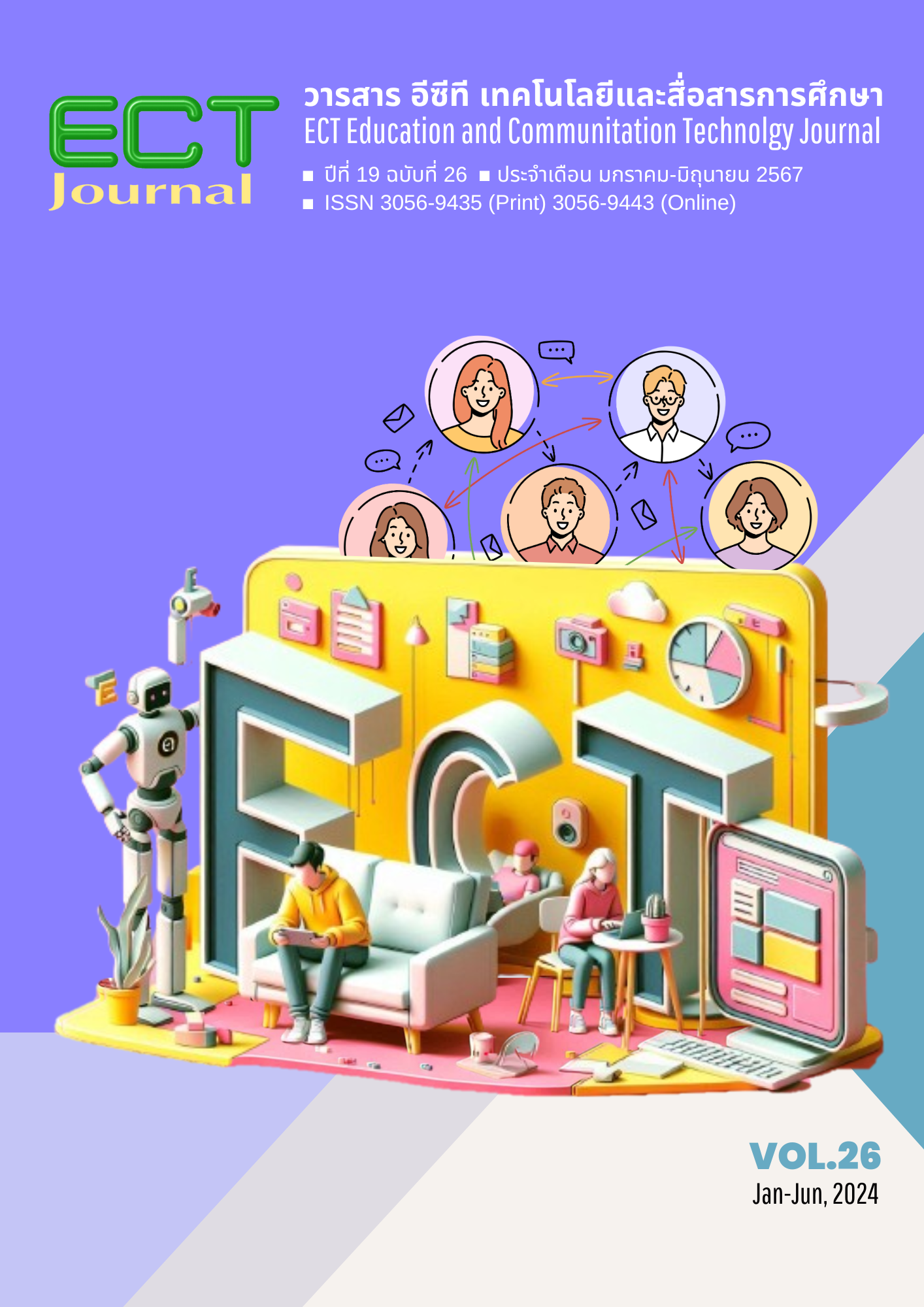The Development of Adaptive E-Learning Entitled “Pha-Mee Activities in a Thai Language subject” for Undergraduate Students
Keywords:
Adaptive e-Learning, Pha-Mee Activities, Undergraduate StudentsAbstract
The objectives of this research were 1) to determine the effective of adapted online lessons on Pha Mee activities in Thai language subject for undergraduate students 2) to study the learning achievement of organizing Pha Mhee activities in Thai subject and 3) to study the satisfaction of the students towards e-learning lessons. The population in this study was 964 undergraduate students in the Thai language department, faculty of Education, Ramkhamhaeng University. The research tools were 1) an adaptive online lesson on organizing Pha Mee activities in Thai subject 2) an achievement test on organizing Pha Mee activities in Thai subject, and 3) a satisfaction questionnaire on the lesson. The statistics used for data analysis were mean, percentage, standard deviation, and t-test. The results showed that 1) the adaptive online lesson on organizing Pha Mee activities in Thai subject efficiency met the efficiency criterion 80/80 2) the full score of learning achievement of the students on Pha Mee activities in Thai subject of the samples was 25. It was found that before learning, the mean score of the students was 16.15, representing 64.60 percent, in the moderate level. The standard deviation was 5.29 and after the study, the mean score of the students was 22.96, representing 91.84 percent, in the highest level. The standard deviation was 2.03. The mean after studying was higher than before studying at the statistically significant at .05, and 3) The mean score of the satisfaction of the learners was 4.87 and the standard deviation was 0.33. The satisfaction was at the highest level.
References
ชวิน พงษ์ผจญ. (2560). เกมกลอน: กิจกรรมการเรียนรู้ร้อยกรองที่มากกว่าความสนุก. วารสารไทยศึกษา, 13(2), 15-50. https://media.phra.in/a2278194a18852c8f8cfe8df380dc804.pdf
ชัยยงค์ พรหมวงศ์. (2556). การทดสอบประสิทธิภาพสื่อหรือชุดการสอน. วารสารศิลปากรศึกษาศาสตร์วิจัย, 5(1), 1-20. https://so05.tci-thaijo.org/index.php/suedureasearchjournal/article/view/28419
ธนภูมิ ก่อกุลดิลก. (2565). ADDIE Model คืออะไร. https://shorturl.asia/KLC3Y
นราวดี พันธุ์นรา. (2542). รายงานการวิจัย เรื่อง ปริศนากวีผะหมี: กรณีศึกษาอำเภอบางบ่อ จังหวัดสมุทรปราการ. มหาวิทยาลัยหัวเฉียวเฉลิมพระเกียรติ.
เนาวรัตน์ พงษ์ไพบูลย์. (2554). เขียนอย่างนักเขียนมืออาชีพ. เยลโล่การพิมพ์.
วิชัย วงษ์ใหญ่ และมารุต พัฒผล. (2564). การเรียนรู้ปรับได้ Adaptive Learning. http://www.curriculumandlearning.com/upload/Books/Adaptive%20Learning_1616200602.pdf
สมดุล ทำเนาว์. (2552). โจ๊กปริศนาเมืองชล ฉบับพัฒนา 2552. โรงพิมพ์กมลศิลป์การพิมพ์.
สำนักงานเลขาธิการสภาการศึกษา. (2560). แผนการศึกษาแห่งชาติ พ.ศ. 2560-2579. บริษัท พริกหวานกราฟฟิค.
สำนักวิชาการและมาตรฐานการศึกษา. (2552). ตัวชี้วัดและสาระการเรียนรู้แกนกลาง กลุ่มสาระการเรียนรู้ภาษาไทย ตามหลักสูตรแกนกลางการศึกษาขั้นพื้นฐาน พุทธศักราช 2551. โรงพิมพ์ชุมนุมสหกรณ์การเกษตรแห่งประเทศไทย.
สำลี รักสุทธ. (2554). สอนอย่างไรให้นักเรียนเขียนบทร้อยกรองเป็น. บริษัท ธนธัชการพิมพ์.
Alshammari, M. T., & Qtaish, A. (2019). Effective adaptive e-learning systems according to learning style and knowledge level. Journal of Information Technology Education: Research, 18, 529-550. https://doi.org/10.28945/4459
Cleave, J. (2020). 6 ways to add adaptive learning to your online training. https://elearningindustry.com/add-adaptive-learning-to-online-training
El-Sabagh, H. A. (2021). Adaptive e-learning environment based on learning styles and its impact on development students' engagement. International Journal of Educational Technology in Higher Education, 18(53), 1-24. https://doi.org/10.1186/s41239-021-00289-4
Kurt, S. (2021). Adaptive learning: What is it, what are its benefits and how does it work? . https://educationaltechnology.net/adaptive-learning-what-is-it-what-are-its-benefits-and-how-does-it-work
Lutkevich, B. (2020). E-learning (online learning). https://www.techtarget.com/whatis/definition/Web-based-training-e-learning
McGuire, R. (2021). What is adaptive learning and how does it work to promote equity in higher education?. https://www.everylearnereverywhere.org/blog/what-is-adaptive-learning-and-how-does-it-work-to-promote-equity-in-higher-education
Torbet, A. (2022). Adaptive learning in practice. https://elearningindustry.com/adaptive-learning-in-practice
Yamane, T. (1973). Statistics: An introductory analysis. Harper & Row.
Downloads
Published
How to Cite
Issue
Section
License
Copyright (c) 2024 มหาวิทยาลัยสุโขทัยธรรมาธิราช

This work is licensed under a Creative Commons Attribution-NonCommercial-NoDerivatives 4.0 International License.
1. ทรรศนะและข้อคิดเห็นใด ๆ ที่ปรากฏอยู่ในวารสาร ECT Education and Communication Technology Journal เป็นของผู้เขียนโดยเฉพาะ สำนักเทคโนโลยีการศึกษา มหาวิทยาลัยสุโขทัยธรรมาธิราช และกองบรรณาธิการไม่จำเป็นต้องเห็นพ้องด้วย
2. กองบรรณาธิการของสงวนลิขสิทธิ์ในการบรรณาธิการข้อเขียนทุกชิ้น เพื่อความเหมาะสมในการจัดพิมพ์เผยแพร่






